A new poll shows that a plurality of Americans would support making Washington, D.C. the 51st U.S. state if its residents voted in favor of the measure.
An Economist/YouGov poll published earlier this week asked respondents whether they would back D.C. statehood if it was supported by the district’s residents. A plurality (41 percent) said they would support the idea, while just over a third (36 percent) said they would oppose it. Nearly a quarter of Americans (23 percent) were unsure.
According to the U.S. Constitution, D.C. is a federal district and therefore not entitled to congressional representation. (It does have one non-voting delegate, Democratic Rep. Eleanor Holmes Norton.) An amendment to the Constitution in 1961 allowed residents to vote in presidential races, but otherwise, the district’s residents are taxed without federal representation.
The House of Representatives passed a proposal in April 2021 that would have granted D.C. statehood, allowing a large portion of the district to become a state while keeping parts (such as Congress, the White House, the Supreme Court building, and national monuments) under federal control. (The constitution requires that there is a federal district, but in terms of its size only stipulates that it cannot be greater than 10 square miles.)
The text of that legislation would have renamed the district to honor abolitionist Fredrick Douglass rather than Christopher Columbus, admitting the State of Washington, Douglass Commonwealth, into the U.S. “on an equal footing with the other States in all respects whatever.” This would have given the state two U.S. senators and a single representative until the 2030 Census, at which time the number could increase due to population size, compared to the rest of the nation.
The bill passed the House without any GOP support, but faced difficult odds in the Senate, where Republicans could use a filibuster to block its passage. Sen. Joe Manchin, a right-wing Democrat from West Virginia, also signaled his opposition to granting D.C. statehood, effectively killing the bill. Because Republicans will be taking over the House in the next congressional session, the prospects of Democrats reintroducing the bill are slim.
Republicans are largely opposed to D.C. statehood for political reasons, as the district has voted for the Democratic candidate in every presidential election since its residents were granted the right to vote. Notably, the district also has a higher percentage of non-white residents than the rest of the nation, on average, as 45.8 percent of D.C. residents are Black, 11.5 percent are Latinx, and only 37.3 percent are white, according to the latest Census statistics.
While the district has voted blue in every presidential race, not every elector from D.C. has voted for a Democrat. In 2000, a “faithless elector” — a person who is designated to serve in the Electoral College but whose vote doesn’t represent the will of their constituents — abstained from voting in protest of the district’s lack of congressional representation.
The vast majority of Washington, D.C. residents support statehood. In 2016, the district held a non-binding referendum on whether statehood should be considered. More than 78 percent of voters said “yes,” while around 13 percent — less than one in seven voters — said “no.”
Our most important fundraising appeal of the year
December is the most critical time of year for Truthout, because our nonprofit news is funded almost entirely by individual donations from readers like you. So before you navigate away, we ask that you take just a second to support Truthout with a tax-deductible donation.
This year is a little different. We are up against a far-reaching, wide-scale attack on press freedom coming from the Trump administration. 2025 was a year of frightening censorship, news industry corporate consolidation, and worsening financial conditions for progressive nonprofits across the board.
We can only resist Trump’s agenda by cultivating a strong base of support. The right-wing mediasphere is funded comfortably by billionaire owners and venture capitalist philanthropists. At Truthout, we have you.
We’ve set an ambitious target for our year-end campaign — a goal of $211,000 to keep up our fight against authoritarianism in 2026. Please take a meaningful action in this fight: make a one-time or monthly donation to Truthout before December 31. If you have the means, please dig deep.
